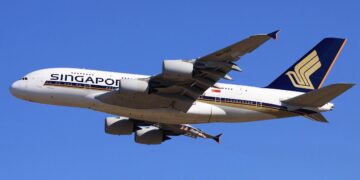Introduction:
As economic activity between Johor and Singapore intensifies, the pressures of traffic congestion have become increasingly evident, prompting the Malaysian government to take decisive action. In a recent announcement, the Economy Ministry unveiled three complete long-term strategies aimed at alleviating the persistent gridlock affecting cross-border commuters. With the Johor-Singapore Special Economic Zone (SEZ) set to enhance regional cooperation and spur progress, these plans are critical to ensuring smooth transit and maintaining economic momentum. This article delves into the government’s initiatives, thier potential impact on traffic flow, and the broader implications for the johor-Singapore economic landscape.
Johor-Singapore Special Economic Zone: Strategic Goals for Traffic Management

The Johor-Singapore Special Economic Zone (SEZ) is set to implement a series of long-term plans aimed at alleviating the persistent traffic congestion that has plagued this vital economic corridor. The Economy Ministry has outlined key strategies that leverage technology and infrastructure betterment. These initiatives focus on enhancing public transport services, introducing smart traffic management systems, and promoting cross-border connectivity through integrated transport solutions. The objective is to streamline movement not only for residents but also for visitors and businesses,thus reinforcing the region’s economic growth.
Critical to achieving a smooth traffic flow, the government plans to:
- Develop an integrated public transportation network: This will include bus and rail services that connect seamlessly with existing options to encourage public transit usage.
- Implement advanced traffic management technologies: The introduction of AI and real-time data analysis will help optimize traffic signals and manage congestion dynamically.
- Enhance border-crossing infrastructure: Upgrades to immigration and customs facilities are vital, aiming to reduce wait times at checkpoints and improve the overall travel experience.
Key Infrastructure Developments to Address Cross-Border Congestion
To tackle the ongoing cross-border congestion between johor and Singapore, the government has outlined three pivotal infrastructure enhancements. Firstly, the extension of the Rapid Transit System (RTS) is set to substantially improve rail connectivity, reducing the dependence on road transport. This project aims to accommodate an increased number of commuters, thereby alleviating pressure on existing traffic lanes and streamlining cross-border travel.
Secondly, the development of dedicated expressway lanes for heavy vehicles is crucial. This initiative will facilitate smoother passage for freight transport while segregating commercial and passenger vehicles to optimize traffic flow. additionally,the enhancement of digital ticketing systems and traffic management technologies will equip authorities with real-time data,enabling efficient control and planning. These collective measures illustrate a robust commitment to enhancing infrastructure, ultimately promising a more seamless commute for thousands of daily travelers.
Integrated Public Transport Solutions for Enhanced Connectivity

The recent announcement by the Economy Ministry regarding the long-term plans to alleviate traffic congestion highlights the need for integrated public transport solutions in the Johor-Singapore Special Economic Zone (SEZ). Efforts to enhance connectivity will focus on several core aspects aimed at streamlining commuter experiences. These include the expansion of existing bus services, the implementation of dedicated public transport lanes, and the introduction of a seamless connectivity system that allows for easy transfers between various modes of transport.
Key initiatives planned to achieve these objectives include:
- Enhanced bus Networks: Expanding routes and increasing the frequency of buses to reduce wait times.
- Dedicated Transport Corridors: Establishing exclusive lanes for buses and other public transport vehicles to minimize delays caused by traffic congestion.
- Smart Ticketing Systems: Implementing a unified ticketing platform that accommodates all transport modes, promoting passenger convenience and integration.
To effectively evaluate the impact of these initiatives, the government will focus on tracking various metrics pertaining to public transport usage and congestion levels. The table below summarizes these metrics:
| Metric | Target | Evaluation Frequency |
|---|---|---|
| Public Transport Ridership | Increase by 30% | Quarterly |
| Traffic Congestion Levels | reduce by 20% | Bi-annual |
| Transfer Efficiency | 90% Satisfaction Rate | Annual |
Policy Framework to Foster Sustainable Commuting Alternatives

In response to ongoing traffic congestion issues between Johor and Singapore, the government’s policy framework emphasizes the necessity of comprehensive planning to promote eco-kind commuting options. A focused approach involves enhancing public transportation networks, which will include investments in efficient rail systems and bus routes that directly connect urban areas to major economic zones. Key elements of this initiative include:
- Integration of multimodal transport systems to facilitate seamless commuter experiences.
- Subsidies and incentives for using public transport, cycling, and walking, encouraging residents to opt for greener modes of transport.
- Development of pedestrian-friendly infrastructure, ensuring safety and accessibility for all commuters.
To operationalize these plans, the government is also exploring collaborations with private sectors and local businesses to create a robust ecosystem supporting sustainable transport. This collaboration could then lead to innovative solutions,such as ride-sharing and mobility-as-a-service platforms,that adapt to the specific commuting patterns within the zones. Additionally, proposed financial models that involve public-private partnerships are designed to fund the infrastructure upgrades efficiently while maintaining low costs for consumers. Below is an overview of the major components of the proposed policy:
| Component | Description | Expected Outcome |
|---|---|---|
| Public Transit Expansion | Improving rail and bus services for better connectivity. | Increased ridership and reduced vehicle congestion. |
| Sustainability Incentives | Financial support for environmentally friendly commuting options. | Higher adoption rates of public and shared transport. |
| Infrastructure development | Building walkways, cycling lanes, and transit hubs. | Safer travel, encouraging non-motorized commuting. |
Public Engagement and Stakeholder Collaboration for effective Implementation

As the Johor-Singapore Special Economic Zone (SEZ) project unfolds, effective public engagement and robust stakeholder collaboration are essential for ensuring that traffic congestion solutions are tailored to community needs and perspectives. The government has emphasized the importance of involving local residents, businesses, and transport experts in the decision-making processes to foster a sense of ownership and commitment among stakeholders. By creating inclusive forums and feedback channels, authorities can gather valuable insights that inform policies and infrastructure developments. Some key strategies include:
- Public Workshops: Regular workshops to engage residents and collect feedback.
- stakeholder Meetings: Involving business leaders in discussions about transport solutions.
- Surveys and Polls: Conducting surveys to gauge public opinion on traffic management initiatives.
To further enhance collaboration,the government could establish a dedicated task force comprising representatives from various sectors,including transportation,urban planning,and community organizations. This task force would facilitate obvious dialog and coordination among stakeholders, ensuring that all voices are heard and considered. Additionally, the implementation of a system to track progress and gather continuous feedback could greatly impact the adaptability and effectiveness of the long-term congestion mitigation plans. An example of such a system could include:
| Feedback Mechanism | Purpose | Frequency |
|---|---|---|
| online Surveys | Gauge public sentiment | Quarterly |
| community Town Halls | Direct engagement with residents | Bi-annually |
| Progress Reports | Update stakeholders on developments | Monthly |
Concluding Remarks
the government’s strategic approach to addressing traffic congestion in the Johor-Singapore Special Economic Zone reflects a commitment to sustainable development and regional collaboration. By implementing these three long-term plans, which focus on enhancing public transportation infrastructure, optimizing traffic management systems, and fostering cross-border connectivity, authorities aim to alleviate the persistent challenges faced by commuters. As both Johor and Singapore continue to deepen their economic ties, these initiatives not only promise to improve the daily commuting experience but also serve as a model for other cross-border regions grappling with similar issues. The success of these plans will ultimately depend on effective execution and ongoing dialogue between stakeholders, ensuring that the johor-Singapore SEZ remains a vital hub for economic growth and cooperation.














Brothers in Arms: Macron, Merz, and Starmer Join Forces to Forge a New Era Beyond the U.S